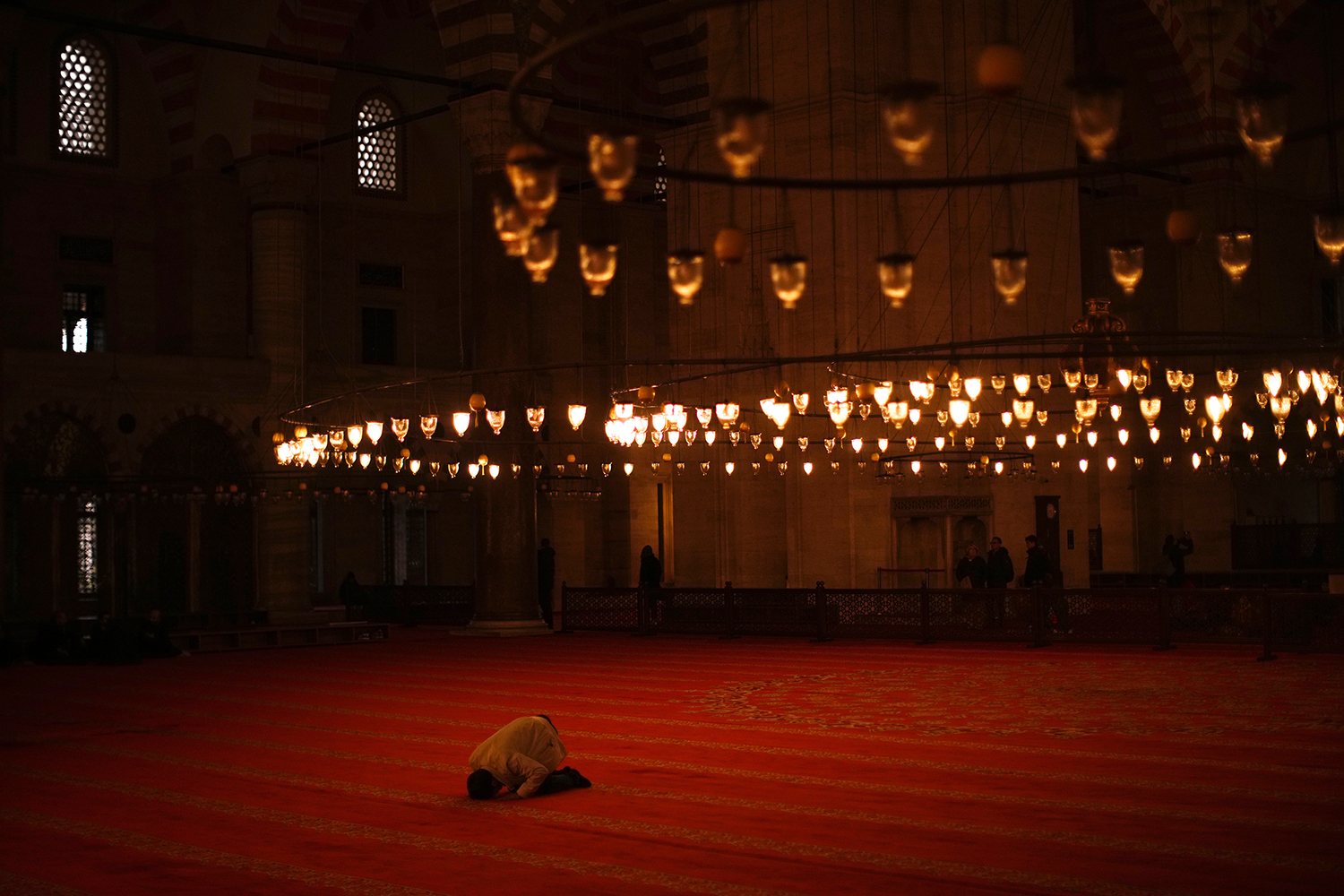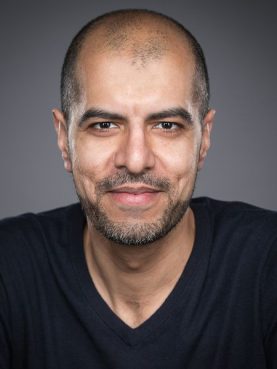(RNS) — You can tell a lot about a faith from its holidays. The things we often overlook as somehow secondary are so frequently foundational. Take Eid al-Fitr, the holiday that celebrates the end of Ramadan, Islam’s month of fasting and prayer. Anyone who experiences any part of that most blessed of Muslim months would find its conclusion an odd occasion for gift giving.
Unless, as with so much else about Islam, there’s more to the story.
What folks largely know about Ramadan is that it’s about abstaining. For an entire cycle of the moon, believers deny themselves food and drink — yes, even water — during daylight hours. Then we gather at sundown to break fast. Throughout, we also try to curtail aggression, avoid less important worldly commitments, spend in charity and stay up the nights — especially the final 10 — petitioning God, worshipping and weeping for hours, exhausting and breaking ourselves.
Ramadan is a time of blessings, when God first descended the Quran and ever after suspends the worst influences of the world. We have more motivation and cause to do good, each and all of us, so much so that you’ll have to leave for the mosque more than an hour before prayers start just to get a parking spot, a problem as exasperating as it is exhilarating. Then we stand shoulder to shoulder, hundreds and even thousands, late even on weeknights.
Tired, worn out, cranky, dehydrated, we seriate ourselves for well over an hour, bowing, prostrating, repeating, absorbing the full recitation of the Quran in 30 parts. If it sounds painful, and frustrating, it is. But it is also beautiful, amazing and incredible, which might explain the actual traffic jams, the thousands who show up here in suburban Cincinnati where I live and everywhere else, not just old but young, women and men from everywhere.
There’s a sweetness to such nights, a delight in this intense adoration of God, our desire to be conscious and mindful of him and only him every minute, and every observant Muslim knows the magic of odd night energy, all of which leads to an obvious question: What are nearly two billion people really celebrating at the end of such an incredible time? If we answer that, we answer a lot about Islam.
In Ramadan, Muslims abstain from the undeniably bad — but also from that which our religion ordinarily far from discourages. (Food, drink, intimacy.) What’s wrong with lunch, after all? Except Ramadan reminds us that our physical needs are a means, not an end, which is God. The Quran says as much: “Fasting is prescribed for you, as it was for those before you, that perhaps you might become ever mindful of Him.”
Some say we fast to know what it’s like to be hungry, which might be partly true, except that early Muslims certainly knew what it was like to be hungry, and it would be strange to have to be reminded for a full month of what you unfortunately suffered from all too often anyhow. (Conversely, it’s far more compelling to those of us blessed to have first-world problems.)

A Muslim worshipper offers a prayer during the Muslim holy fasting month of Ramadan at Suleymaniye Mosque in Istanbul, Turkey, Wednesday, April 5, 2023. (AP Photo/Francisco Seco)
As I see it, Ramadan strikes still deeper, and Eid honors something far more fundamental.
Who we are. Why we are here. And that we are. Specifically, that you can never be, except in a place, in a time and in a body.
We believe God created humanity to worship him — in the world.
In the Quran’s second chapter, God announces he is creating Adam and Eve, and we their descendants, to be custodians and stewards of Earth, tasked with voluntarily and freely choosing to uphold his will on the Earth. We are thus made as creatures partly spiritual, with souls and free will, but clearly also biological, with bodies, with DNA, with needs and desires for things down here — where we belong.
Our lives are a struggle to live that in balance. Which is why we have Ramadan — and why we celebrate when it’s over.
We have a month to deny ourselves much of the world, to remind us of what really matters, to emphasize that we can abstain, that it is good to not have everything we want, that in fact we are happier, and our lives are so much more meaningful, when we think less of ourselves and more of each other. All the more so when we do all of this together. At a time when we are consumed by the virtual and the ephemeral, this emphasis must not be overlooked.
Yes, in Islam, there is praise for worshipping alone — we are, after all, individuals and meant to be accountable to God as such. But so much of our faith is collective precisely because our worship is meant to guide us to think always of God as we live in the world.
It’s one thing to be close to God when you’re unbothered, well-rested and well-fed in a comfortable home, after all. It’s another thing when you’re packed in like monotheistic sardines, trying to focus as innumerable children careen through the prayer hall. You’re wondering how you’re ever going to escape the parking lot, and did you send that email? That is the point: We’re not interested in a piety that has no ability to survive reality, let alone speak to it.
Seen from that perspective, so much of Islam appears different. We don’t forbid alcohol because we have some opposition to enjoyment; rather, we shun anything that causes us to forget who we are, that risks depriving us of the reason, the courage and the confidence required to live purposefully in the world.
The reason we dress modestly is not to deny the reality of gender and attraction so much as insisting we walk in the world in ways that reflect our dignity and stature, without tipping over into arrogance or self-importance: When I go to the mosque for taraweeh, I have to remember how I comport myself affects the prayer of countless people around me — and they, in turn, should do the same.
None of this is easy. It can even be frightening. But the crowds at our mosques give the lie to the idea that religion is fading because it is burdensome. We are quite happy to bear burdens, as it turns out, so long as we understand why. All the more so when we’re bearing them together.
In Ramadan, we learn that life is a challenge, that everything we do matters, that we’re all meant to be here and what we do here isn’t random, meaningless or superfluous. But Ramadan is an exit from the ordinary, a vacation where you eat less and pray more. Like any vacation, it must end. We celebrate its end because we are about to get back to work, to do what needs to be done.

Haroon Moghul. Photo by Rick Bern
We resume our highest purpose, to do the really hard things from which character is created. And why not dress up for that?
(Haroon Moghul is the author of “Two Billion Caliphs: A Vision of a Muslim Future.” A sometime Friday preacher, he teaches Islamic history, philosophy, ideas and possibilities in Cincinnati and around the world. The views expressed in this commentary do not necessarily reflect those of Religion News Service.)
Title: Celebrate that it’s over: Why Eid al-Fitr matters to Muslims
URL: https://religionnews.com/2023/04/21/celebrate-that-its-over-why-eid-al-fitr-matters-to-muslims/
Source: Religion News Service
Source URL: https://religionnews.com/
Date: April 21, 2023 at 09:51PM
Feedly Board(s): Religion